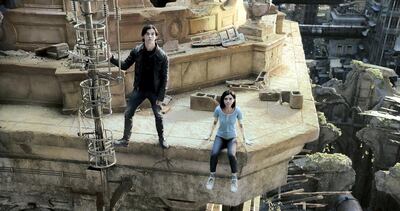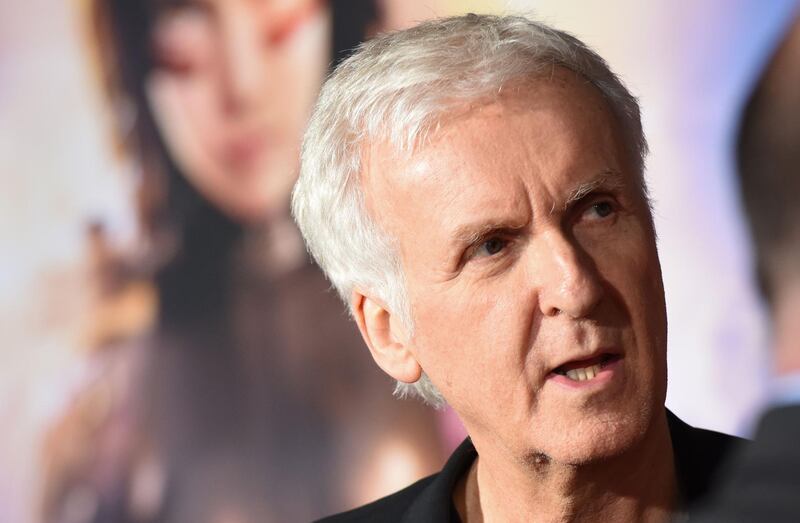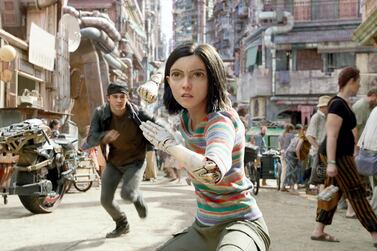The manga adaptation of Alita: Battle Angel could already be regarded as something of an all-star collaboration. The film unites celebrated Avatar and Titanic director James Cameron with Machete and Sin City director Robert Rodriguez. However, in this instance, Cameron takes the back seat as co-writer and producer, while Rodriguez co-writes and directs.
It doesn't end there, though, as Cameron reveals to The National that Oscar-winning Pan's Labyrinth and The Shape of Water director Guillermo del Toro also played a crucial role in the film's gestation, by introducing Cameron to Gunnm, the Japanese comic on which the movie is based.
"I stumbled upon it, actually. My friend, Guillermo del Toro, is a real fan of all things, you know, graphic novels and so on," Cameron says. "He said, 'You've got to check this out.' So I did. And I promptly fell in love with the character and I said, 'Look, I want to do this, I want to make this. You weren't going to do it?' And he said, 'No, you do it.'
“And so it was an instantaneous decision. I went after the rights, got them from the artist, Yukito Kishiro, and I just started to develop it.”
Two decades in the making
That conversation took place 20 years ago, and by 2004, Cameron was still struggling to get his script down to a filmable length. The following year, he was given $10 million (Dh36.7m) by Fox to make a proof of concept clip for Avatar – a film that had been in development for 10 years already – and, as work intensified on what would go on to become the highest-grossing movie ever made, Alita fell by the wayside.
That was, at least, until Rodriguez entered the picture. "Robert, who I had known for years, said, 'What are you doing with Alita?' And I gave him the script and he fell in love with it and said, 'I have to do this,'" Cameron says.
"I said 'All right, then you're the guy.' And it was quick. He read it and I said, 'It's way too long.' He said, 'Let me take a crack at it.' We didn't have a deal or anything, it was a handshake. He went off for a couple of months, cut it all down [and took] 50 pages out. I was dreading the read a little bit, because I thought, 'he's going to have taken out everything I loved', but he didn't.
“He protected it. Beautifully. And then I thought, ‘all right, he knows what to do. He’s the guy.’ And so, here we are.”
The appeal of Alita
It is fair to say that, as the director of the two highest-grossing movies in history in Titanic and Avatar, as well as other box office smashes such as Terminator: Judgment Day and Aliens, Cameron could probably receive backing to film any story he chooses, so what was it about Alita that appealed so strongly?
"I can give you an example," the director-producer-writer says. "When she takes her heart out and offers it to her paramour … I want to see that scene. You can't do a love story and not have that scene, right? But that's just an example. Initially, I approached it as kind of Romeo and Juliet; she's a cyborg, he's human. He wrecks cyborgs for a living and she doesn't know that, so they're star-crossed lovers."

Cameron says that the "third vertex" was the parallel storyline involving Alita's father, which appealed to him as the father of a young daughter. "I wanted to tell that story of the female coming of age," he says.
"We all come of age, we all have to deal with that teen angst and that sense of who am I? What am I here for? Do I live up to my parents' expectations, or do I do my own thing? But I think women have a tougher time, in the sense that society tries to press them into a feminised role, as opposed to taking on leadership and authority roles and that sort of thing.
"And so I thought, 'why not do a female empowerment story?' And she becomes this confident, powerful character. But she's not that initially."
Handing over control
It is clear that Cameron feels deeply involved with the story of Alita. But was it challenging to hand the creative control of a project he carried with him for so long over to a third-party director, albeit somebody Cameron has known for years?
"We passed the ball a lot," he says. "He'd be going into a scene saying, 'You know I've got a little problem with this scene.' And I'd say, 'I'll do a couple of pages for you real quick.' And I'd fire that back within an hour or so. And he'd say, 'I like it, but what if I invert this line and that line and just do it' … and I'd say, 'Why didn't I think of that?' And it was like that the whole way through.
"It comes from trust. I'd known him for, I want to say 25 years, and I knew him as an innovator. So it just went very smoothly. Not that you don't have problems, you always have problems on any production, but we solved the problems."
In fact, Cameron insists that when it came to shooting the movie, he took a step back and allowed Rodriguez to get on with the job in hand. "The interesting thing is I never went to the set at all," Cameron says. "He and I worked super-closely all the way through pre [production], but from day one it was his set. We'd talk behind the scenes, and I'd comment on the dailies, send him notes and that sort of thing. But I never went to the set because I wanted the cast and the crew to know that it was his showhat he was the dude."
Desperate to impress
Cameron may have left Rodriguez alone on set to make the film, but there was one person that the producer was desperate to impress with the final product – Gunnm's author Kishiro. "I wasn't there when he saw it the first time," Cameron says. "[Co-producer] Jon Landau took it and showed it to him a few days ago.
So what was Kishiro's reaction when he saw the final film? "He was thrilled. He was thrilled to see it come to life," Cameron says. "And that meant a lot to us. He was honoured that Robert and I took this on and did it.
"That's a mutual adoration society right now. But if you think about it, it was an artistic hand-off – him to me, me to Robert. It really represents all three of our brains kind of thrown into a blender."
Alita: Battle Angel is in UAE cinemas from today






